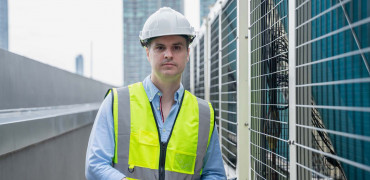Sustainability and carbon emissions reductions are vital areas where facilities management can significantly contribute to achieving net zero in our built environment.
The facilities team may have direct responsibility for purchasing energy for their organisation. Still, FM professionals are also hands-on when arranging other pieces in the sustainability puzzle: from managing waste, to introducing on-site renewables.
And one of the most important aspects of reducing a building’s carbon footprint is optimising its energy performance.
It costs more to fix an issue than to prevent it from happening.
Cutting energy use
With the growing focus on achieving net zero emissions from the built environment, this part of the facilities management function is already growing.
Legislation such as Minimum Energy Efficiency Standards (MEES) means that building owners must cut energy use to improve their EPC ratings.
The IWFM (Institute of Workplace and Facilities Management) has pointed out that the UK government is looking more closely than ever at the link between building energy use and achieving Net Zero.
It seems likely that buildings over 1,000m2 will become subject to a mandatory rating scheme that focuses on performance-based energy use. The full launch of the scheme is set for 2023/24 and would affect around 10,000 UK buildings.
This puts FM teams front and centre for carefully balancing the needs of occupants for comfortable and productive indoor environments against tighter energy efficiency and carbon targets - managing energy demand, optimising energy use, and implementing energy-saving technologies.
It’s a challenging time to be in facilities management.
Planning is key to efficiency
Heating, ventilating and air conditioning systems are central to achieving these goals since they use around 40% of energy in commercial and public buildings.
Optimising the energy performance of these significant energy users in a building can contribute to better overall energy use and improved comfort conditions.
Good maintenance practice is vital to hit these energy efficiency targets for buildings and to maintain efficient performance over the long term.
At Mitsubishi Electric, we work with clients to develop planned preventative maintenance (PPM) programmes to ensure that HVAC systems achieve and maintain optimum performance.
At its simplest, PPM ensures that equipment doesn’t fail unexpectedly, leading to building problems and repair costs.
Tackling faults as they arise is a short-term approach: It costs more to fix an issue than to prevent it from happening.
But PPM has other benefits. It extends the life of HVAC equipment by optimising its operation.
As a result, building owners get the best and most energy-efficient performance out of that equipment. Manufacturers build modern HVAC equipment to last, but it needs regular servicing and maintenance.
The importance of data
Another vital role for FM professionals in taking buildings towards Net Zero is gathering and collating data.
Existing rating schemes already require many organisations to track their energy use, but the proposed changes from the government are making this even more critical.
For clients, data is essential to track progress on their corporate sustainability journeys, particularly as ESG issues are now included in company annual accounts.
Remote monitoring is an excellent option for this challenge. Data can be collected from a single building or across an entire estate. Mitsubishi Electric’s remote monitoring service will also track the performance of individual equipment, such as chillers.
This allows us to keep track of energy use and gives us insights into indicators that the chiller is not running optimally – allowing us to send an engineer to check before breakdowns occur.
Increasingly, facilities teams are finding themselves in the spotlight for leading on and delivering mission-critical energy efficiency. Mitsubishi Electric’s Service and Maintenance team has the experience to help FM professionals understand the issues (with our library of CPD guides) and practical advice from our engineers.
Together, we can tackle these challenges and ensure buildings are ready to take the road to Net Zero.
Kris Swiderski is Head of Service and Maintenance




